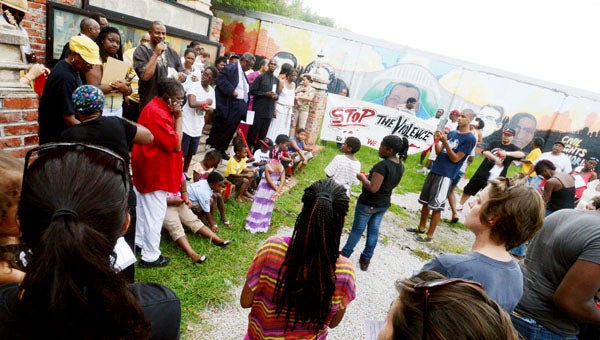Funeral procession rallies support for voting rights
Published 8:56 pm Tuesday, August 6, 2013

A small crowd gathers near the Edmund Pettus Bridge to honor the anniversary of the day Voting Rights laws were signed into action 48 years ago. Some fear voting rights are at stake following recent decisions by lawmakers to overturn Section 4 of the act. — Jay Sowers
A funeral procession paraded from East Selma through West Selma and then over the Edmund Pettus Bridge Tuesday, honoring those who lost their lives in the midst of the voting rights movement in the early 1960s.
The National Coalition of Leaders to Save Section 5 hosted the “National Voting Rights Day” Tuesday and the funeral procession was just one part of the day — other elements included events in Mobile, Birmingham and Montgomery. Coalition members and supporters met in Montgomery for a vigil Tuesday night.
While organizers did not expect to gather 250,000 people in the city as they did in 1965, their goal was to get as many people as possible.
Prior to the Montgomery vigil, Selma coalition members gathered in front of Brown Chapel AME Tuesday afternoon to start a funeral processional to symbolize those who fought and died for the right to vote in trying to make the Voting Rights Act a reality.
Franklin Fortier, one of the organizers for the event in Selma, said the way in which the funeral procession went through Selma was strategic, based on the routes marchers would travel during the movement.
“We always have to remember those that came before us because they had a strategy that not only worked, but that united the community,” Fortier said about going from Brown AME Chapel and through different parts of Selma with funeral hearses and posters. “Part of our desire is to show respect for those who have come before us and also to inspire new generations.”
Fortier said a fight is still needed today to preserve the voting rights and he feels that the fight will be more difficult than that of the 1960s because of a culture that he said is insensitive to race and poverty.
While in 1965, voting rights marchers fought for the right to vote, the coalition said Tuesday they were fighting to keep that right in place. Sen. Hank Sanders told those in the coalition about what the removal of Section 4 of the Voting Rights Act did for equality.“It was an act that changed this country,” Sanders said. “It didn’t just change who voted, but it changed who was elected. It didn’t just change who was elected but changed the policies of this country.”
Sanders said now 40 years later, lawmakers didn’t stab Section 5 in the heart, but rather, “cut the artery to the heart with removing Section 4.”





